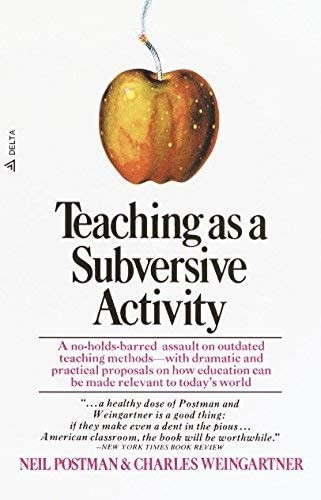In 1969 Neil Postman and Charles Weingartner wrote Teaching as a Subversive Activity. Despite their critics (then and now), this book sets the foundation for what has become best practices in education: inquiry-based learning, student-driven learning, problem-based learning. A few notes:
Critiques of education:
"The learner comes to understand that what he is asked to think about in school has no bearing on what he needs to learn to think about. He, therefore removes the best, the most vital part of himself from his formal education." (p. 49-50)
Role the environment:
"the medium itself, i.e., the environment, is the message. "Message" here means the perceptions you are allowed to build, the attitudes you are enticed to assume, the sensitivities you are encouraged to develop – almost all of the things you learn to see and feel and value. You learn them because your environment is organized in such a way that it permits or encourages or insists that you learn them." (p. 17)
New methods (for 1969):
"The inquiry method of teaching and learning is an attempt at redesigning the structure of the classroom. It is a new medium and its messages are different from those usually communicated to students. Our purpose here is to begin to describe the 'grammar' of the medium, for of all the 'survival strategies' education has to offer, none is more potent or in greater need of explication than the 'inquiry environment'." (p. 25)
"What one needs to ask of a standard is not, 'Is it high or low?', but, 'Is it appropriate to your goals?' If your goals are to make people more alike, to prepare them to be docile functionaries in some bureaucracy and to prevent than from being vigorous, self-directed learners, then the standards of most schools are neither high nor low. They are simply apt. If the goals are those of a new education, one needs standards based on the actual activities of competent, confident learners when they are genuinely engaged in learning. One must be centrally concerned with the hearts and minds of learners." (p. 67)
"the new education, in addition to being student-centered and question-centered must also be language-centered. And here at the risk of laboring the point, we must say that by language centered we do not mean what the English teachers an apt to mean by the phrase: that instead of emphasizing literature in the classroom, one should emphasize the study of grammar, language history and regional dialects" (p. 102-103)

